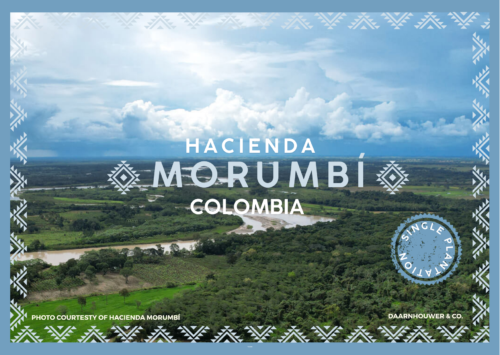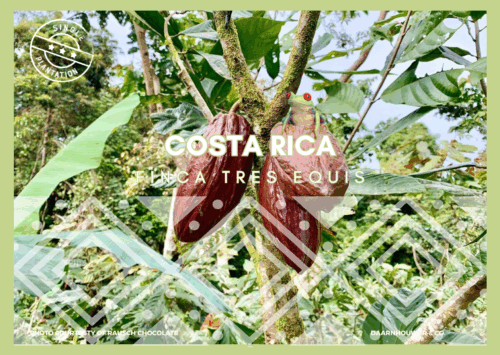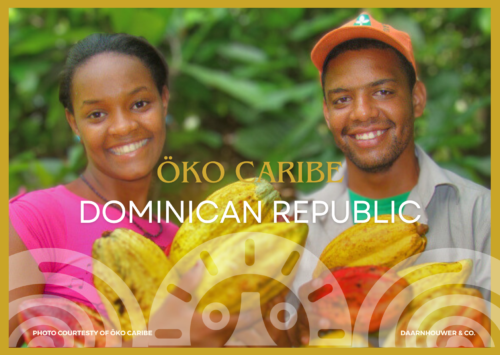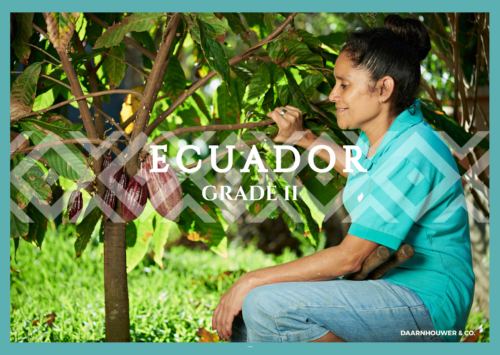Cocoa Beans
-
 Hacienda Morumbí is a single estate plantation contributing to strengthening the environmental and social conditions of Puerto Lleras in Meta, Colombia. Two thirds of the farm is comprised by protected primary forest. The plantation uses Colombian Trinitario hybrids and applies especially designed protocols for their two cacao mixes.
Hacienda Morumbí is a single estate plantation contributing to strengthening the environmental and social conditions of Puerto Lleras in Meta, Colombia. Two thirds of the farm is comprised by protected primary forest. The plantation uses Colombian Trinitario hybrids and applies especially designed protocols for their two cacao mixes. -
 In 2014, Rausch Chocolate established a cacao plantation within the Finca Tres Equis family farm in Turrialba, Costa Rica. The German-Costa Rican team led by Dr. Elsa Hegmann has applied an agroforestry scheme to succesfully regenerate pasture land and transforme the formerly poor soils into a very productive cacao farm grown. The cacao is used for their premium chocolate line. The cacao plantation contributes to the rich biodiversity within and beyond the borders of the Finca.
In 2014, Rausch Chocolate established a cacao plantation within the Finca Tres Equis family farm in Turrialba, Costa Rica. The German-Costa Rican team led by Dr. Elsa Hegmann has applied an agroforestry scheme to succesfully regenerate pasture land and transforme the formerly poor soils into a very productive cacao farm grown. The cacao is used for their premium chocolate line. The cacao plantation contributes to the rich biodiversity within and beyond the borders of the Finca. -
 Öko Caribe works alongside more than 160 farmers in Duarte. Together, they produce and commercialize around 500 MT of top quality Organic certified cacao on a yearly basis. Through technical and financial support, the small holder farmers are able to improve the quality and yield of their cacao which is collected fresh and fermented in a state of the art fermentation center run by Öko Caribe. Öko Caribe conventional cocoa beans showcase the same commitment to quality as the company has shown with its organic certified cacao.
Öko Caribe works alongside more than 160 farmers in Duarte. Together, they produce and commercialize around 500 MT of top quality Organic certified cacao on a yearly basis. Through technical and financial support, the small holder farmers are able to improve the quality and yield of their cacao which is collected fresh and fermented in a state of the art fermentation center run by Öko Caribe. Öko Caribe conventional cocoa beans showcase the same commitment to quality as the company has shown with its organic certified cacao. -
 Our Grade II cocoa beans are produced under the social, environmental and economic principles of social enterprise Biocacao. Since 2021, the Ecuadorean government classifies cocoa beans as Grade I, II or III depending on its physical characteristics: size, number of defects, fermentation grade, etc. Click below to learn more about the work of Biocacao with its member farmers.
Our Grade II cocoa beans are produced under the social, environmental and economic principles of social enterprise Biocacao. Since 2021, the Ecuadorean government classifies cocoa beans as Grade I, II or III depending on its physical characteristics: size, number of defects, fermentation grade, etc. Click below to learn more about the work of Biocacao with its member farmers. -
 Kuapa Kokoo, which means ‘good cocoa farming’ in Twi, was founded in 1993 by a number of leading cocoa farmers who recognized the benefits of organizing farmers and creating a company to market their own cocoa. The co-operative is also co-owner of the Divine Chocolate Company in the UK which markets chocolate products made from their own cocoa beans.
Kuapa Kokoo, which means ‘good cocoa farming’ in Twi, was founded in 1993 by a number of leading cocoa farmers who recognized the benefits of organizing farmers and creating a company to market their own cocoa. The co-operative is also co-owner of the Divine Chocolate Company in the UK which markets chocolate products made from their own cocoa beans. -
 In the region of Kerala, Ellen and Luca established a social enterprise they named Go Ground to support local small holder cacao farmers. Through careful post harvesting practices they offer consistent quality and traceability. Their fruity and spicy cacao flavors have become part of the chocolate collection of many high quality bean to bar and chocolate producers.
In the region of Kerala, Ellen and Luca established a social enterprise they named Go Ground to support local small holder cacao farmers. Through careful post harvesting practices they offer consistent quality and traceability. Their fruity and spicy cacao flavors have become part of the chocolate collection of many high quality bean to bar and chocolate producers. -
 With an annual cacao harvest averaging around 100-150 tons per year, Jamaica currently exports about 90% of its annual production. Until recently, the beans underwent a "polishing" process that gave them a unique outward appearance. This process is no longer used on the beans but the richness and depth of flavours remains.
With an annual cacao harvest averaging around 100-150 tons per year, Jamaica currently exports about 90% of its annual production. Until recently, the beans underwent a "polishing" process that gave them a unique outward appearance. This process is no longer used on the beans but the richness and depth of flavours remains.






